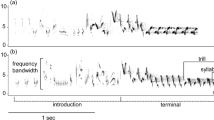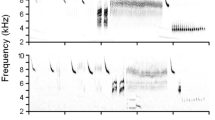Summary
Female Mountain White-crowned Sparrows from Colorado were tested in a laboratory playback experiment to determine their response to male songs from their own natal dialect and to those from an alien dialect of the same subspecies, Zonotrichia leucophrys oriantha (Fig. 1). Observations were made on locomotor activity and copulation postures produced during each experimental test session.
The subjects gave copulation displays almost exclusively when hearing their natal dialect and new or no displays when hearing the alien dialect (Fig. 2). The birds also exhibited significantly greater locomotor activity when hearing the natal dialect than they did when hearing the alien dialect (Fig. 3).
We conclude that females are sensitized by their early song learning experience to be responsive to songs from their natal dialect and virtually sexually unresponsive to songs from an alien dialect. We speculate that the copulation posture given in the experiment implies that females in natural populations would preferably only mate assortatively with males from their natal dialect region.
Similar content being viewed by others
References
Baker MC (1975) Song dialects and genetic differences in white-crowned sparrows (Zonotrichia leucophrys). Evolution 29:226–241
Baker MC (1982) Genetic population structure and vocal dialects in Zonotrichia (Emberizidae). In: Kroodsma DE, Miller EH (eds) Evolutionary and ecological aspects of acoustic communication in birds. Academic Press, New York (in press)
Baker MC, Mewaldt LR (1978) Song dialects as barriers to dispersal in white-crowned sparrows, Zonotrichia leucophrys nuttalli. Evolution 32:712–722
Baker MC, Mewaldt LR (1981) Response to “Song dialects as barriers to dispersal: A re-evaluation.” Evolution 35:189–190
Baptista LF (1975) Song dialects and demes in sedentary populations of the white-crowed sparrows (Zonotrichia leucophrys nuttalli) Univ Calif Publ Zool 105:1–52
Baptista LF, Morton ML (1980) Song dialects and mate selection in montane White-crowned Sparrows. Am Ornithol Union (Abstr 4, Annual Meeting)
Blanchard BD (1941) The White-crowned Sparrow (Zonotrichia leucophyrys) of the Pacific seaboard: environment and annual cycle. Univ Calif Publ Zool 56:1–135
Brown JL (1969) Territorial behavior and population regulation in birds. Wilson Bull 81:293–329
King AP, West MJ, Eastzer DH (1980) Song structure and song development as potential contributors to reproductive isolation in Cowbirds (Molothrus ater). J Comp Physiol Psychol 94:1028–1036
Konishi M (1965) The role of auditory feedback in the control of vocalizations in the White-crowned Sparrow Z Tierpsychol 22:770–783
Krebs JR, Kroodsma DE (1980) Repertoires and geographical variation in bird song. Adv Study Behav 11:143–177
Marler P (1970) A comparative approach to vocal learning: song development in White-crowned Sparrows. J Comp Physiol Psychol 71:1–25
Marler P, Tamura M (1962) Song “dialects” in three populations of White-crowned Sparrows. Condor 64:368–377
Nice MM (1941) Studies in the lief history of the Song Sparrow, vol II. Dover, New York
Nottebohm F (1969) The song of the chingolo, Zonotrichia capensis, in Argentina: Description and evaluation of a system of dialects. Condor 71:299–315
Payne RB (1973) Behavior, mimetic songs and song dialects, and relationships of the parasitic indigo birds (Vidua) of Africa. Ornithol Monogr 11
Petrinovich L, Patterson T, Baptista LF (1981) Song dialects as barriers to dispersal: A re-evaluation. Evolution 35:180–188
Searcy WA, Marler P (1981) A test for responsiveness to song structure and programming in female sparrows. Science 213:926–928
West MJ, King AP, Eastzer DH (1981) The cowbird: Reflections on development from an unlikely source. Am Sci 69:56–66
Author information
Authors and Affiliations
Rights and permissions
About this article
Cite this article
Baker, M.C., Spitler-Nabors, K.J. & Bradley, D.C. The response of female Mountain White-crowned Sparrows to songs from their natal dialect and an alien dialect. Behav Ecol Sociobiol 10, 175–179 (1982). https://doi.org/10.1007/BF00299682
Received:
Accepted:
Issue Date:
DOI: https://doi.org/10.1007/BF00299682




